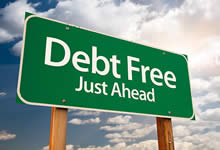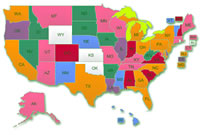 For this one, you’ll need your credit card bills. A recent copy of each of them. We’re not kidding. Ughh!
For this one, you’ll need your credit card bills. A recent copy of each of them. We’re not kidding. Ughh!
Don’t worry — no one will see them. This is just for you — between you, yourself, and your credit rating. Also, get a calculator and a piece of paper.
First, let’s get an idea of how you are doing with your credit card debt.
| Credit Card Debt Questionnaire | |
| Is your credit card debt making your home life unhappy? | |
| Do your credit card habits cause you to think less of yourself? | |
| Does your credit card debt cause feelings of shame, guilt, or hopelessness? | |
| Are your credit card debts affecting your reputation? | |
| Do you have a different feeling when buying things on credit than when paying cash, a feeling of being accepted, of being grown up? | |
| When asked, do you deny that you have any credit card debt? | |
| When you go out with friends, do you offer to pay the entire bill with your credit card, even though you are already too deep in debt? | |
| Have you ever given false information in order to obtain credit? | |
| Does the pressure of your debts cause you to have difficulty sleeping? | |
| Do you justify your debt by telling yourself that when you get a windfall you’ll pay it all off and everything will be fine? | |
| Do you find yourself muddled about your financial situation-“forgetting” account balances, monthly expenses, loan interest rates, fees, fines, or contractual obligations? | |
If you checked several of the boxes above, the emotions you are feeling are probably because your credit card habits are out of control. Having credit card debt doesn’t make you a bad person. But it’s important to begin to get back your control right now. You can free yourself from the bondage of credit card debt by facing your debt head-on and creating a new sense of freedom in your life. Here’s how.
First Step: List Your Debt
Put your credit card bills into one big pile. Get out a piece of paper and write “Credit Card Debt, Be Gone!” on the top. Write down the information for each card on the piece of paper, like this:
| Card Name | Balance | Interest Rate | Minimum Payment | Account Number | Phone Number |
There, that wasn’t so hard, was it?
Second step: Lower Your Interest Rate
Now, figure out what you can do to reduce your credit card interest rate. You wouldn’t believe how much difference the interest rate makes. Look at chart below to see the difference that interest rates make. If you pay $100 per month toward a $5,000 credit card balance, you’ll see that at a 5.9% interest rate it will take you nearly five years to pay it off and you’ll pay $753 in interest. Raise that interest rate to 21.9%, and it will take you more than eleven years to pay it off. You’ll pay an astounding $8,470 in interest on a $5,000 purchase!
Time and Interest to Pay off a $5,000 Credit Card Balance
($100 per month)
| At this interest rate |
It will take you this long |
And you’ll pay this much interest |
| 5.9% | 4 years 10 months | $753 |
| 7.9% | 5 years 1 month | $1,084 |
| 9.9% | 5 years, 5 months | $1,474 |
| 12.9% | 6 years, 1 month | $2,212 |
| 15.9% | 6 years, 11 months | $3,252 |
| 18.9% | 8 years, 4 months | $4,911 |
| 21.9% | 11 years, 3 months | $8,470 |
So let’s get going reducing those credit card interest rates!
Call each of the credit card companies on your list and ask them if you can have a lower rate. Do they have any special programs? What about great deals for a valued customer like you?
Next, if you have any lower-rate cards that aren’t maxed out, transfer balances from the higher-rate cards to the lower-rate ones.
Finally, if you get any of those credit card offers in the mail, compare them to your “Be Gone!” list as you receive them. If an offer beats your highest interest rate and has no annual fee, sign up for the new card and transfer as much as you can from any card with a higher rate. Of course, zero-percent interest rate cards are the best. Keep an eye out for them.
Be sure to update your “Credit Card Debt, Be Gone!” list each time you lower an interest rate.
Third step: Pay off your cards
Now, send every penny you can scrape up to the highest rate card on the list, in addition to your minimum payments. If it’s more than the cost of a stamp, send it in. Here’s a link to a snazzy financial calculator to help you figure out how long it will take to pay off your credit card. Just click on the tab “credit card” at the top of the financial calculator.http://moneyclubs.com/facts.financialcalculator.htm
Check out www.moneyclubs.com for cost-cutting ideas-we have lots of savings suggestions to help you save $5 here, $20 there. Step by step, it really adds up.
A word of caution about refinancing:
Refinancing your home (or taking out a home equity line of credit) can sometimes be a good way to pay off your credit card debt-and sometimes it can be a disaster. The good part is that you convert your credit card interest into tax-deductible interest — and you usually pay a lower rate as well.
The downside is that you’ve just shifted your debt from your credit card to your house. If you haven’t solved your problems with spending, you’ll just run up your credit card balances again and end up with twice the problem. Now, instead of owing money on your credit card, you owe more money on your home and your credit card. Fail to pay your home mortgage, and you’ll lose your house. So carefully consider your spending habits before you decide to refinance your house or take out a home equity line of credit!
About severe credit card debt:
If you are in way over your head and you need serious help, visit the website for the National Foundation for Credit Counseling, a non-profit organization, at www.nfcc.org. They have lots of services available that can help you.







